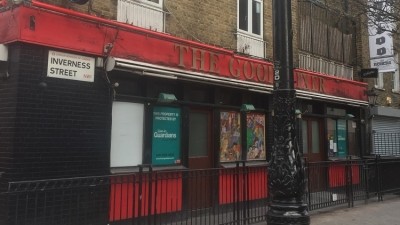Work the room: pub extensions

Savills director of licensed leisure Tony Hunter establishes the pub’s lease as a crucial starting point: “The tenant needs to be fully informed of what the lease says about whether they’re allowed to carry out extensions and how those are going to be dealt with when it comes to rent review.
“Obviously, the tenant doesn’t want to end up paying twice for something.
“Some leases are very strict. They state that no alterations will be allowed and that no disregard will be given at rent review, which is actually quite penal to a tenant because it saps any entrepreneurial spirit out of a licensee if they are not able to develop their business and be reasonably treated for it.”
Your business and funding plans
Noel Moffitt, head of brokerage for pubs at Christie & Co, says that before penning extension plans, it’s essential to review how you currently use the space at your disposal.
“Utilising what’s already there can often save an operator a lot of money because it’s always more cost-effective to relocate in the existing building without going through all the expense of extending,” he says.
These considerations should form the basis of a business plan that can help secure essential funding for extending a pub premises once it’s been determined that such work is the best route forward.
Davey Co managing director Paul Davey adds: “Whatever the purpose of the extension you are considering committing to, what is of critical importance is a well-thought-out assessment as to the improved trading performance the extensions will bring in terms of turnover and profitability, and also enhanced future value of the capital asset, ie, the property, when it comes to selling up.
“A business plan setting out the case for the extension is a must. This will present your rationale for doing it, the pros and cons of doing it as opposed to not, and a projected cash flow and profit-and-loss account, ideally for the three years following completion of the scheme.
“This should take into account the capital required, loan servicing and repayment if it is to be borrowed, the time line of any disruption the works will cause to the existing operation and an honest assessment of any potential interim loss in sales income. The measure of the viability of embarking upon the extension should also include the effect on future value.”
Moffitt adds that high-street banks are one of the primary sources of funding, provided they are presented with such a plan and awareness is shown over where costs may be incurred further down the line. Slightly closer to home, other funding options exist, although publicans should be aware of the implications of pursuing them.
Moffitt adds: “If it’s a tied or tenanted public house, you can often ask your landlord to assist with any extensions, but on the basis that it will be rentalised.”
Davey concludes that regardless of where funding comes from and who sees your busi-ness plan, there can only be one final note:
“The end state must be improved sales and profitability and improved capital value of your going concern.”
Be realistic
Moffitt cites kitchen expansions as a common example of publicans getting carried away with improvements and being unable to recoup the outlay.
“What we have seen time and time again is, if they are foody people, they tend to over-specify the kitchen that they’re about to build,” he explains. “It’s always a case of ensuring that the type of business that you’re operating, and the kitchen you’re trying to provide, actually fulfil what’s needed because, often, they’ll over-spec the equipment and it’ll go above and beyond the requirements of their current business.
“So for instance, a fully fitted kitchen can be anywhere between £70,000 and £100,000 but it won’t always add that to the business. Before you start to spend large sums of money you’ve got to ensure you think the business will grow by X and that an extension will add profitability to the bottom line.”
Navigate red tape
Stephen Taylor, managing director at Guy Simmonds, explains: “Unless you are a freeholder, you will need the permission of your landlord before making any alteration to the premises – and in such circumstances – it is likely that the pub-owning business will want to control the entire project.
“All changes to licensed premises will also need to gain the approval of the local licensing authority and the local planning authority – for which detailed plans will be required.”
Savills’ Hunter adds that publicans shouldn’t be daunted by the prospect of consulting local authorities about their business plans: “Most local authorities are quite encouraging for someone to do something that’s going to maintain the pub and make it more viable, though there are times – if it’s a listed building, for example – when it becomes a bit more difficult.
“What they also need to make sure of is, if a business is in an area that’s covered by something like the National Trust, for instance, whether there are any stipulations over what’s allowed to happen on the property.
“For most local and community pubs that’s not going to be the case but, if it is in an area
covered by something like that, it’s probably worth the tenant making absolutely sure they can go ahead with it – otherwise it’s a lot of wasted time and cost.”
Get an architect involved
“Once you’ve decided what you want to pursue, it is essential you consult an architect,” says Taylor, “preferably one you have checked to see has a track record in designing and managing similar projects for licensed premises.
“The architect will design the scheme and draw up plans with the aim of complying
with all relevant regulations and securing all necessary permissions. They will cost the scheme, determine timescales for the work and source contractors.
“Most importantly, they will manage the project, ensuring work is undertaken in accordance with the detailed specification, the timetable, and to the required standard.”
Your marketing plan
Finally, Taylor emphasises that marketing your improvements is essential. Shouting about your new and improved pub on social media can not only provide a spike in footfall but broaden your customer base and give your extension business a fiscal shot in the arm.
“Your business website and social media have large roles to play in this, but don’t forget the value of local radio advertising or flyers distributed on the premises or strategically throughout the capture area for your business.
“It is important that your new facilities draw custom as soon as they are up and running. Word of mouth recommendations should then do their work.”
To find out more about pubs for sale, lease and tenancy visit our property site.







